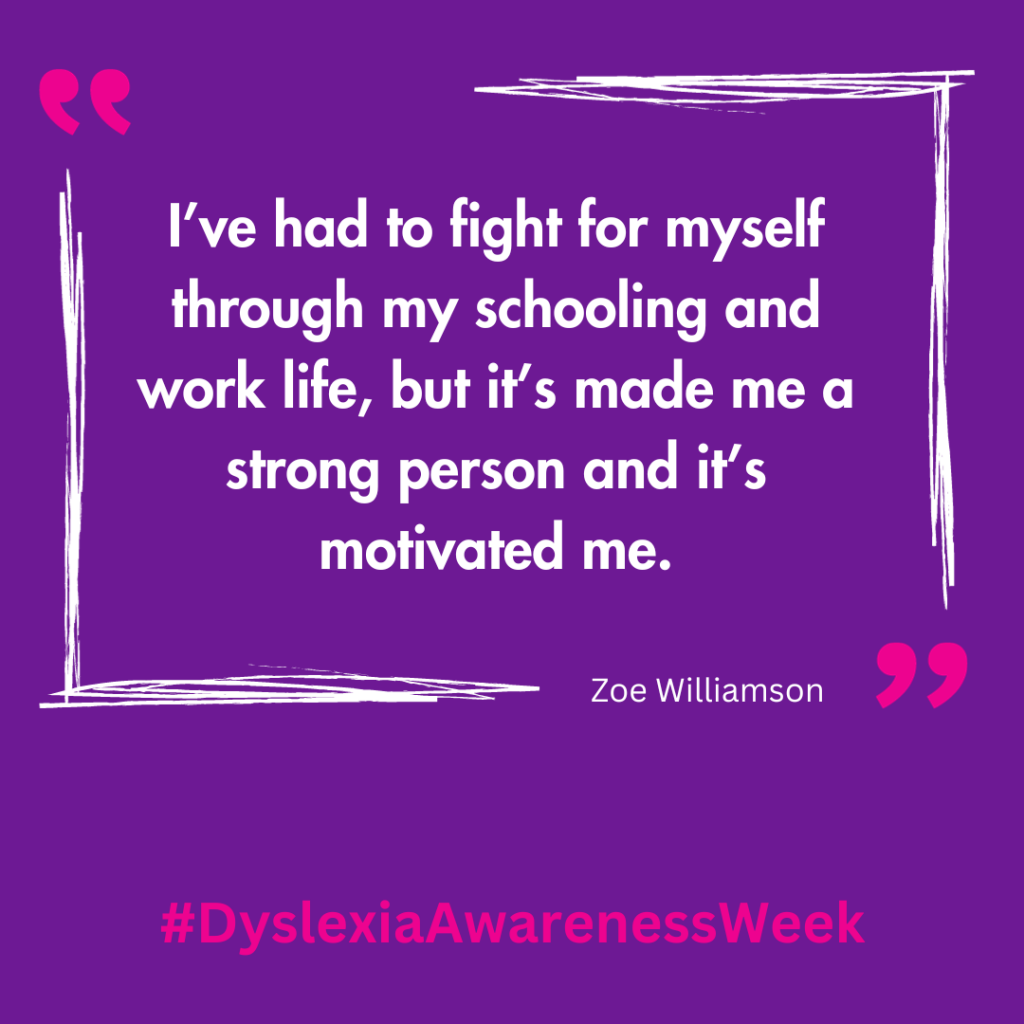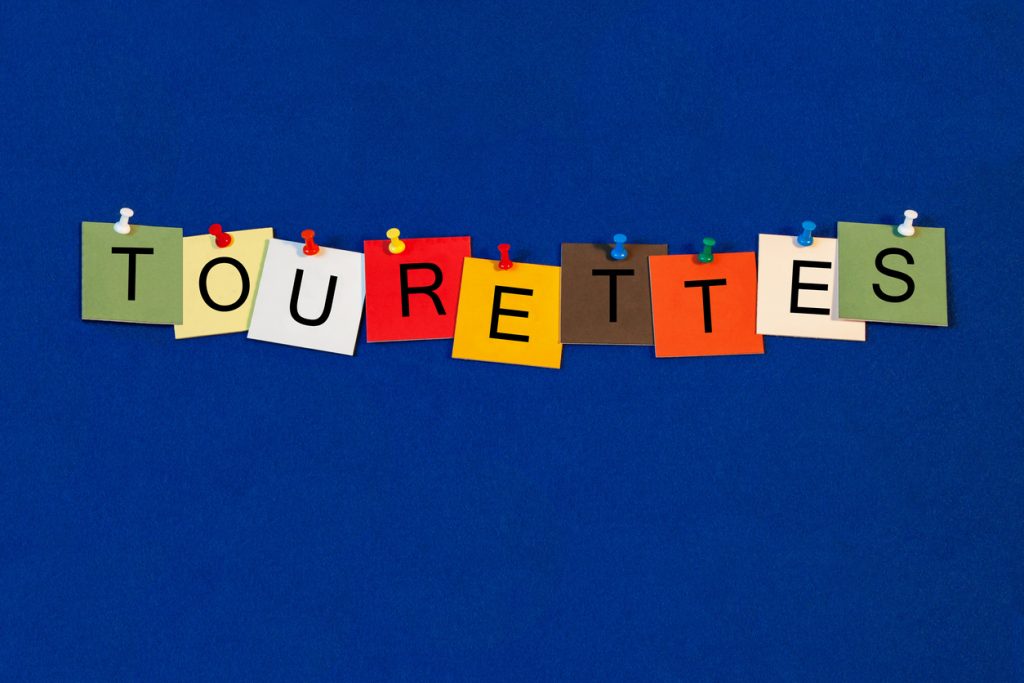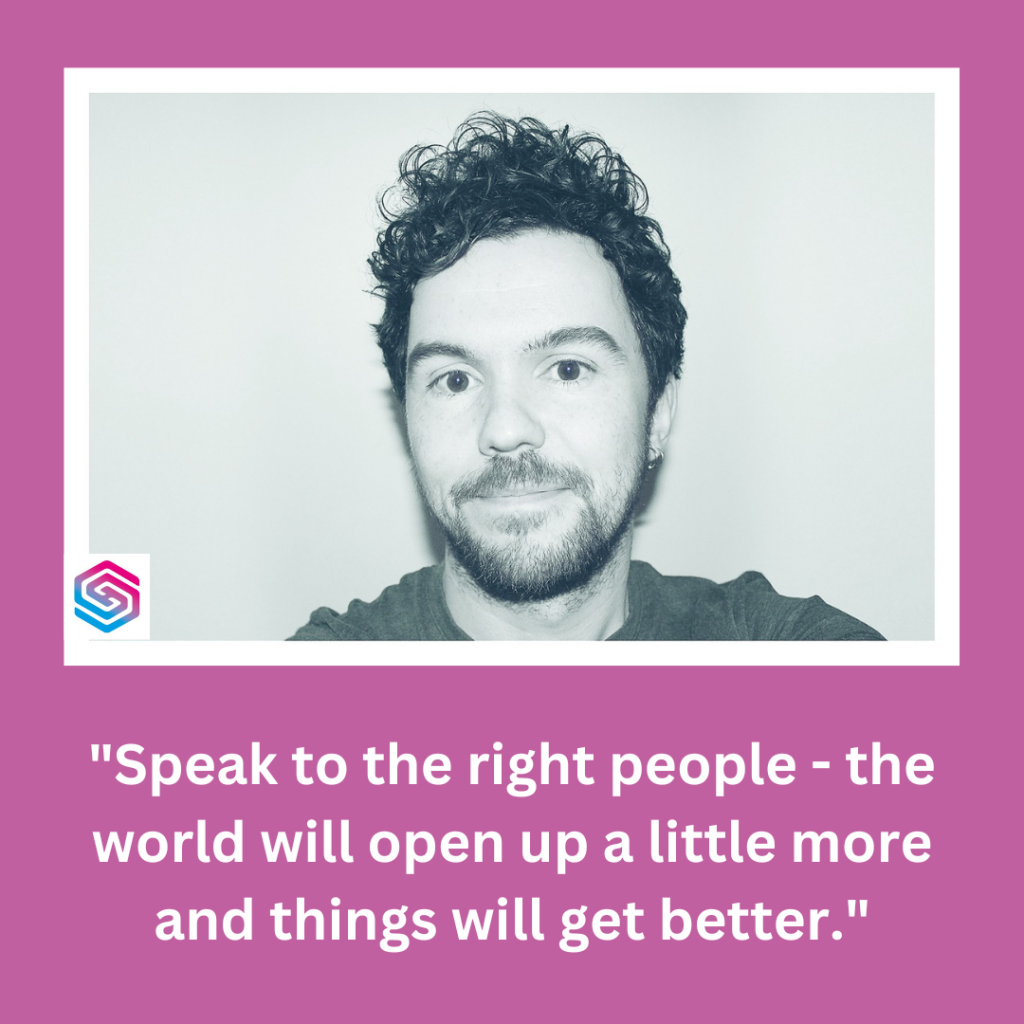T/W This article might contain material of a sensitive nature that could be triggering for some individuals.
Chloe writes about her experience of living with ARFID (Avoidant/Restrictive Food Intake Disorder)…
*Image changed for anonymity
“I’ve had ARFID for as long as I can remember…”
My parents used to tell a lot of stories about me throwing up my baby food if they changed one ingredient in it. From an early age I remember experiencing a lot of anxiety around food. There are a huge number of foods that I just physically can’t eat. I tried so much, but every time I put one of these foods in my mouth my body would automatically react by spitting the food out or gagging. This was completely out of my control, and not something I did deliberately to be rude – in fact, I was desperate to be able to just swallow food normally and not draw unnecessary attention to myself.
The different foods someone with ARFID can and can’t tolerate are different in everyone and going into detail about the lists of what foods I “do and don’t like” is something that makes me feel very uncomfortable and anxious, but I think most people with ARFID will relate to the effects these difficulties with eating had on the rest of my life. At primary school, I remember feeling incredibly worried every time a friend invited me over for dinner. My mum would speak to their parents on the phone and explain that I was a “very fussy eater” – back then, none of us realised that I had an eating disorder. Part of me would get very upset by this constant labelling as “fussy” or “picky” with the implication that I was choosing to be this way and I felt that other people’s food wasn’t “good enough” for me. This is something that’s carried on throughout my life and, to be honest, I don’t think it will ever fully go away. My mum and my friend’s parents would work out a way of adapting what they’d planned to cook so that I’d be able to eat it and be told in advance exactly what I’d be eating. As far as everyone else was concerned, that was the end of the problem.
Except it has a major long-term effect on you when every single time you eat with a group of people in a restaurant, at their house or even in your own home, they are all eating the same meal and you are eating something different. It’s not so much the difference in food; it’s the constant comments about how bland or plain your meal looks, constant questioning of why you won’t eat the “normal” meal, being constantly offered sauces that your brain doesn’t even register as food, being compared to other children who are “better behaved” because they eat a wider range of food and feeling so isolated and uncomfortable but also terrified of expressing any of this for fear of being labelled “ungrateful” or a “drama queen”.
“I could write a book about all the different parts of my life that have been negatively impacted by my eating disorder…”
It’s affected friendships, work relationships, school trips, opportunities to travel and work abroad, holidays, my physical and mental health and so much more. ARFID is diagnosed based on how many different foods you restrict, but it’s so much more than that. ARFID is not wanting to go to a family member’s wedding because you know how ashamed you’ll feel not eating the meal that cost them £100 per person. It’s going on “exciting” family holidays to exotic destinations, which you can barely remember because you couldn’t eat enough and could barely keep yourself awake. It’s being told “you’ll eat it if you’re hungry enough” and having the experience to know that isn’t true. It’s all the physical effects of being literally starving and still not being able to eat the sandwich your friend makes for you. It’s having panic attacks in restaurants, mentally shutting down whenever anyone even mentions food, hiding from your work colleagues at lunchtime and feeling like you’re going insane because you just don’t trust tomatoes.
“In my early 20s, I discovered that my struggles with food had a name –
Avoidant/Restrictive Food Intake Disorder.”
It was such a huge relief to understand that there were people out there like me, people who understood me, and that I wasn’t some kind of freakish alien. To be honest, my early experiences with being repeatedly told that my eating disorder was just me being fussy or rude or ungrateful or weird made me extremely hesitant to seek help. This part of my life was also the time when I first started attempting to seek help for other mental health issues and facing rejection and dismissal over much more widely understood conditions meant that for years, I didn’t say anything about my issues with food.
A couple of years ago I did try and discuss ARFID with a support worker from my community mental health team. I didn’t use the term “ARFID” as I was embarrassed about seeming like someone who thought they knew better than the professionals. I spoke in detail about my struggles with eating, the limited range of foods I was able to eat and my extreme social anxiety around food and eating. The support worker told me “That’s really weird, I’ve never heard of it before”. She asked me if I had any issues with body image or wanting to lose weight, which I didn’t, and then never mentioned it again. Months later, I finally broke down in tears and asked her why she “didn’t care that I had an eating disorder”. She told me that as I’d said I didn’t have any body image concerns, I couldn’t have an eating disorder.
“I’m now under a different community mental health team and have a reasonably supportive GP and am slowly coming round to the idea of reaching out for help again.”
I’ve connected with other people with ARFID online, through social media and the Beat online support groups, which has massively helped validate my feelings that this is something that can be treated and that I deserve help for. I still find it much more difficult to discuss all of this in “the real world” with people who might not have ever heard of it before, than online.
“I have a couple of very close friends who know about my struggles.”
They’ve both been incredibly supportive and understanding, don’t put pressure on me to eat or comment on my food, and they’re people I know I can talk to about anything. I think that helps a lot – when friendships/relationships aren’t purely focused on food. It’s something I don’t think people without eating disorders are fully aware of, but an incredible amount of personal relationships do revolve around food. Think about what you normally do when you meet up with friends, and you’ll probably find you go out to different restaurants, go out for coffee and snacks, or grab a takeaway. When you’re dating someone new, nothing is more romantic than going out for a fancy meal or cooking for each other. Even topics of conversation with casual acquaintances and colleagues can be so food-focused – “What did you have for dinner last night? What did you bring for lunch today? What was the food like on your last holiday?”
“Having people who are aware of how often these conversations/activities are happening and how triggering they can be is so important and being open to other ideas instead.”
I don’t feel like my friendships are lacking anything from being less food focused. I feel really lucky to have people in my life who I can have really random conversations with, share jokes or learn new things from, and know that chatting to them is going to make us both happy and sometimes surprised, but it will never be a constant stream of recipe ideas!
My best friend and I don’t see each other much because she lives several hundred miles away, but when we do see each other, we have a tradition that’s survived 18 years of friendship – we find the nearest branch of Zizzi and go for lunch. We both read the menu, even though we know exactly what we’re getting and order our usual dishes. On the rare occasion that we decide to go somewhere else, she always sends me a copy of the menu beforehand, and I veto anywhere that doesn’t have any food I’ll eat. It helps so much when restaurants have their menus online, and I know this is the case for people with all kinds of other dietary restrictions as well.
“I think something to be mindful of with ARFID is it affects everyone differently…”
So, some of my achievements are very personal to me and might not be something that someone else with ARFID relates to at all! One example is getting more protein into my diet. I’m vegetarian which adds to the challenge and growing up my diet was always massively lacking in protein. When I went to university, I decided to start trying some meat alternatives. I started small and would make a tiny portion with my normal dinner and eat alone so there was no pressure to eat lots of the new food. Several years later, I now have 3 “meat substitute” products I eat regularly. I’ve also added a couple of different brands of protein bars to my diet and eat cereal with added protein. It’s taken a very long time but I’m really proud of all the progress I’ve made and am optimistic that I can make even more progress in the future.
“Being able to actually say ‘I have ARFID’ was something that took a very long time for me…”
About a year and a half ago, I moved into a shared house and decided that this time I was going to be upfront with my new housemates and tell them about my eating disorder from the start. Just before we moved in, I sent them a message telling them that I have an eating disorder called ARFID. I sent them a link to a YouTube video explaining what it is, told them that because of this I probably wouldn’t be into cooking shared meals but was still happy to cook and eat at the same time as them. I warned them that they might find that my meals looked strange or too plain, but this was the food I could manage and what I needed to eat to stay healthy. I talked a bit about how in the past, so many comments had been made about my food and how stressed and anxious this made me feel.
They were both really understanding and that lessened my anxiety a lot when I was moving in. Neither of them ever made a comment about what I was cooking/eating, occasionally one of them would bring home food and leave it in the kitchen for anyone to eat if they wanted it, but I never felt pressured to eat anything I didn’t want to. We’d have “separate but together” meals, where we all individually cooked our own meal but sat down to eat together. Having this positive response meant so much to me and made me feel so much more secure.
“The main trigger for me at the moment is going out to eat.”
I’ve never in my life been to any kind of restaurant/cafe and been able to order any of the main courses on the menu. I normally order a starter as my meal or make up a meal out of side dishes (which tend to just be one or two ingredients without many “embellishments”). I’d say about 50% of the time I go out for a meal, when I order I will get some kind of comment/question from the waiter. This can range from asking if I’m sure about my choice or pointing out the main course section of the menu, right through to demanding to know what exactly my dietary restrictions are and then trying to pressure me into ordering a ‘proper’ meal that they’ve decided I will be able to eat. Situations like this have caused so much anxiety in the past that I’ve mostly stopped going out to eat with other people.
Another issue when eating with people I don’t know well is they will ask me why I’m ordering sides and not a ‘proper’ meal. If I tell them that I’ve ordered my usual dish because that is what I want to eat, they’ll tell me that I “should’ve said something” about how there was nothing on the menu for me and we could have gone somewhere else. This gets kind of frustrating when whatever restaurant we had gone to, I would have the same thing.
“I think in the past I felt a lot of pressure to explain everything, and this caused me so much anxiety as I felt I had to reveal all my complicated feelings about food to everyone I ate with.”
Especially as a teenager, when I wasn’t even aware of what ARFID was and believed the barrage of comments about how I was “just being weird” and “didn’t know what I was missing out on”, this could be really upsetting. Nowadays I’m much better at setting boundaries and being okay with people not fully understanding me. If people ask why I’m eating a certain food or in a certain way (e.g., not having sauce on things), I will say something simple like “this is what I want to eat/the way I want to eat it” and then move the conversation on. I’ve found that the less you engage with people on topics like this, the less room there is for them to try and ‘fix you’ by arguing with you about your own food preferences.
I’ve also had this slowly growing realisation that whilst my particular issues with food have dominated my mind for my entire life, other people really aren’t thinking about what I eat that much. They might be mildly curious, but the majority of the time, if I make it clear this isn’t something I want to discuss, they move on and think about other things. I had a job last year where a group of my colleagues would regularly go to the pub after work for dinner. I really wanted to join in but there was nothing on the menu that I would eat. One evening when I was invited, I decided to go home, cook myself dinner, and then join them for drinks. I was so anxious that I’d get a bunch of comments and questions about why I wasn’t eating, but no one batted an eyelid! One colleague told me it was a good idea to save money and she was thinking of doing something similar next time, and that was the end of the discussion.
“One of the problems with having ARFID is there’s virtually no guidelines on how to treat it in the UK, so services find it easier to just dismiss it as nothing.”
Whether you’re offered any kind of treatment at all and what treatment you’re offered will massively vary depending on where you live, and even in the ‘best’ areas, the NICE guidelines don’t cover ARFID, so it’s very hard to get treatment, especially if you’re over 18 and aren’t also autistic. Having said that, my first piece of advice would be to accept and make the best of any support you’re offered. There are a lot of practitioners out there who genuinely want to help all their patients and are willing to learn about rare conditions and adapt their practice to this.
“If you’re not at the stage of being offered professional support yet, it’s so important to speak to someone you trust.”
I struggled for so long because I felt like no one would ever understand what I was going through. That is such a lonely feeling, and you don’t have to feel that way. If you feel able to, speak to your parents, another family member, your GP, a teacher at school you get on with or another trusted adult. It might be easier to talk to someone who’s already involved in preparing meals for you, as they’re likely to already have an idea that this is something that’s difficult for you.
“I’d also really recommend reaching out to Beat.”
They have a lot of really great information on their website, and they have a helpline you can either call or you can use their webchat to speak to someone. All their volunteers know a lot about different eating disorders, and they can signpost you to get further support, or just listen if you need to vent about a stressful situation. Everything you tell them is confidential and they won’t make you do anything you’re not ready for.
If you’re able to, connecting with other people with ARFID can help so much. This can be difficult because it feels like there’s so few of us out there! But searching for ‘ARFID’ on social media can help you find communities of people going through a similar thing. Beat runs online support groups which I’ve found really helpful. There’s also a big overlap between ARFID and autism – if you’re autistic then you might find that other members of the autistic community and people in support groups will be able to understand and relate to your difficulties with food, even if not all of them meet the criteria for a diagnosis of ARFID.
Hidden Strength thanks Chloe for sharing her story with us and wish her strength and love in her continued recovery. We also give our thanks to the amazing team at Beat. If you think you have ARFID or need help with an eating disorder, please visit https://www.beateatingdisorders.org.uk/ to get information and support.








